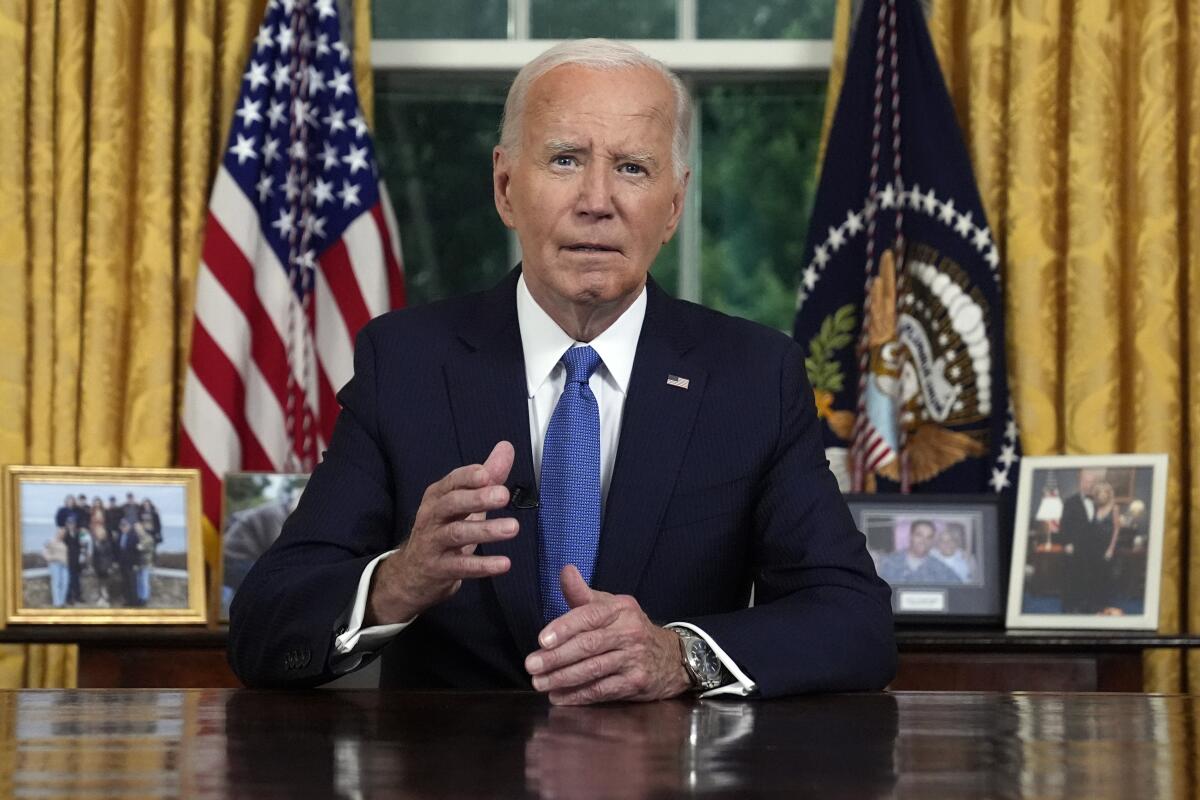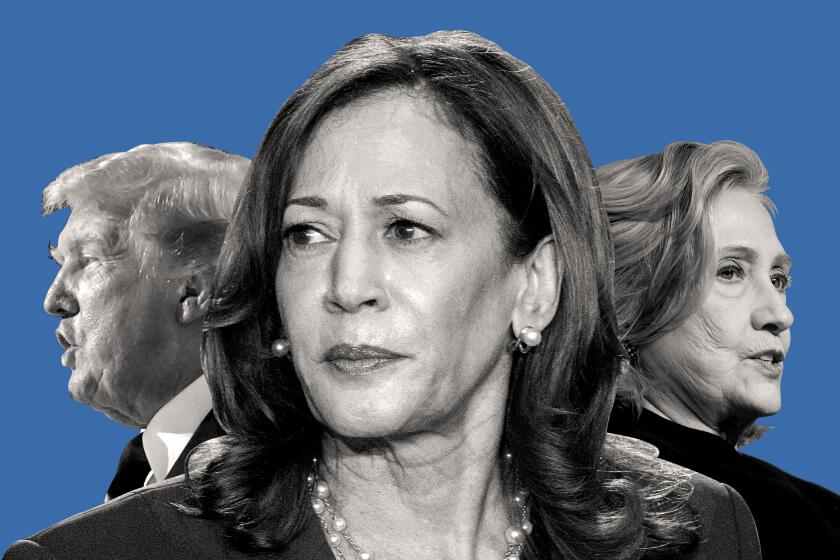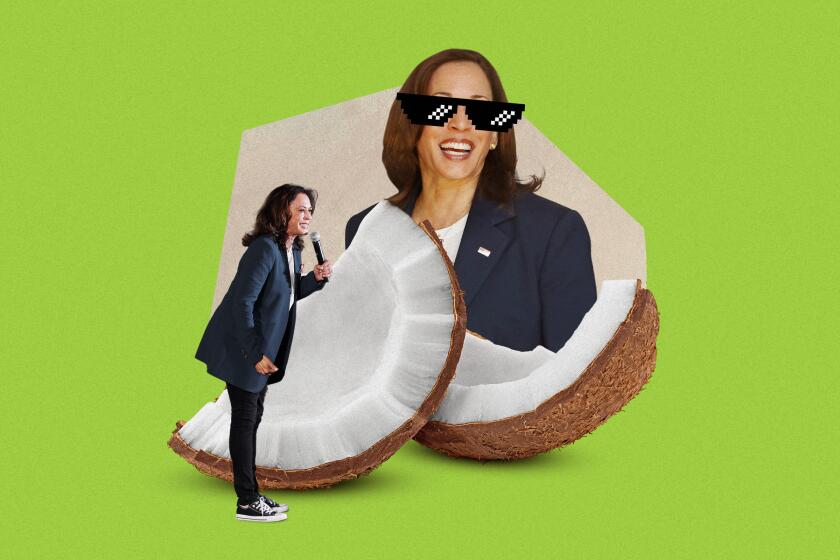Biden’s address to the nation: ‘I revere this office, but I love my country more’

- Share via
Saying, “I revere this office, but I love my country more,” President Biden formally announced the end of his bid for a second term in office with a nationally televised address from the Oval Office on Wednesday evening.
Biden said that while his record was strong, he felt compelled to unite the Democratic Party and to throw his support behind Vice President Kamala Harris.
“I believe my record as president — my leadership in the world, my vision for America’s future — all merited a second term,” Biden said. “But nothing can come in the way of saving our democracy. That includes personal ambition.
“So I decided the best way forward is to pass the torch to a new generation. It’s the best way to unite our nation.”
Placing himself at the end of a long chain of American leaders, Biden mentioned presidents from George Washington to Franklin D. Roosevelt. Twice he noted that he was speaking from behind the Resolute Desk — a gift of Britain’s Queen Victoria that has been used by nearly every president since the 1880s.
Dueling narratives on Kamala Harris reflect a unique election: She’s poised to be the first woman of color to top a major-party ticket, and Trump is the first convicted felon to do so.
Biden’s family watched from just off camera, while hundreds of administration staff members attended a White House viewing party. Harris watched the address in Houston, where she was staying overnight after visiting the city’s emergency operations center for a briefing on recovery efforts following Hurricane Beryl.
Although the 11-minute speech did not mention Republican presidential nominee Donald Trump, implicit throughout was the threat that Biden contends his opponent poses. (That claim stems largely from Trump’s attempt to reverse the results of the 2020 election, which he lost to Biden.)
“The defense of democracy, which is at stake, is more important than a title,” he said. “It’s not about me, it’s about you … your families, your futures. It’s about ‘we the people.’ We can never forget that and I never have.”
Biden gave a long list of his accomplishments, saying he had pulled the country out of “the worst economic crisis since the Great Depression” — caused by the COVID-19 pandemic — and signed laws that strengthened gun regulations and capped the price of prescription drugs for senior citizens.
He pledged to keep working hard in his final six months in office, saying he hoped to end the war in Gaza and bring home hostages held by Hamas; to strengthen the North Atlantic Treaty Organization, in support of Ukraine and other nations; and to bring reforms to the U.S. Supreme Court.
Toward the end of his remarks, he endorsed Harris. “She’s experienced. She’s tough. She’s capable,“ Biden said. “She’s been an incredible partner to me and the leader for our country.”
At one point he struck a highly personal note.
“Nowhere else on Earth could a kid with a stutter, from modest beginnings … one day sit behind the Resolute Desk, in the Oval Office, as president of the United States. Here I am,” he said. “That’s what’s so special about America. We’re a nation of promise and possibilities, of dreamers and doers, of ordinary Americans doing extraordinary things.”
Only last week, Biden had scoffed at the notion he would leave the race. Speaking at the NAACP’s national convention in Las Vegas, he called out to the audience: “So let me ask you, are you all in?” The loud response: “All in!” To which Biden retorted: “Because I’m all in!”
But just a day later, on July 17, Rep. Adam B. Schiff (D-Burbank) joined those calling on Biden to step aside, saying “it is time to pass the torch” to new leaders in the Democratic Party. Former House Speaker Nancy Pelosi (D-San Francisco) also reportedly informed Biden that she thought he could not win the Nov. 5 election.
Political observers said the views of the two Californians were crucial to Biden’s decision, announced Sunday, to drop out of his rematch with Trump. Biden had been in Rehoboth Beach, Del., recovering from COVID-19 since last Thursday when he made the decision to withdraw.
He quickly threw his support behind Harris, saying that picking her as his running mate in 2020 was “the best decision I’ve made.” He added: “It’s time to come together and beat Trump.”
Democratic officials and rank-and-file members quickly coalesced around the vice president, making her the all-but-certain presidential nominee when the party holds its convention in Chicago, starting Aug. 19.
Harris also got good news from her campaign treasurer: She raised $81 million in the 24 hours after Biden announced that he would not seek another term — the largest campaign haul over that period in history.
The closest parallel to Biden’s speech in modern times came more than half a century ago, when President Lyndon B. Johnson used a televised address from the White House to say that he would not seek a second full term in the White House.
Will the coconut and ‘brat summer’ memes pay off for Kamala Harris? Young progressive voters try to harness a viral moment.
Johnson spent all but the waning moments of a nearly 41-minute address, given in March 1968, to discuss America’s struggles in the Vietnam War, reiterating his offer to the North Vietnamese to begin peace talks.
He said that the nation had become too divided over the war in Southeast Asia. Given the momentous decisions he faced overseeing the war and peace talks, Johnson said, “I do not believe that I should devote an hour or a day of my time to any personal partisan causes or to any duties other than the awesome duties of this office — the presidency of your country.
“Accordingly, I shall not seek, and I will not accept, the nomination of my party for another term as your president,” Johnson concluded.
By stepping back, Johnson opened the door to a hard-fought contest for the Democratic presidential nomination. Robert F. Kennedy appeared in a strong position to be the nominee after winning the California primary in June.
But Kennedy was assassinated at the end of his victory party in Los Angeles on June 5, 1968. Hubert Humphrey, Johnson’s vice president, went on to win the nomination. But in the fall, he lost a close election to the Republican nominee, Richard M. Nixon.
More to Read
Get the L.A. Times Politics newsletter
Deeply reported insights into legislation, politics and policy from Sacramento, Washington and beyond. In your inbox three times per week.
You may occasionally receive promotional content from the Los Angeles Times.













